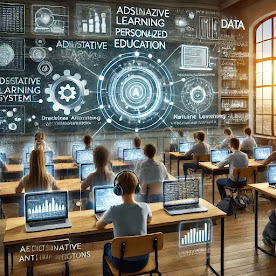
The Impact of Machine Learning on Personalized Education
Machine learning (ML) is revolutionizing various sectors,
and education is no exception. With its ability to analyze vast amounts of data
and identify patterns, machine learning is driving the development of
personalized education systems that cater to the unique needs of each student.
This shift from traditional one-size-fits-all teaching methods to customized
learning experiences holds the potential to enhance educational outcomes
significantly.
Understanding Personalized Education
Personalized education refers to tailoring the educational
experience to meet the individual needs, preferences, and learning pace of each
student. Traditional educational systems often struggle with this due to the
diverse nature of student abilities and the constraints of standardized
curricula. Machine learning bridges this gap by enabling adaptive learning
environments that can adjust in real-time to the learner's needs.
Role of Machine Learning in Personalized Education
- Data-Driven
Insights: Machine learning algorithms analyze data from various
sources, including student interactions with learning materials,
assessment results, and even behavioral data from classroom environments.
By processing this data, ML models can identify trends and patterns that
help in understanding a student's strengths, weaknesses, and learning
preferences.
- Adaptive
Learning Systems: Adaptive learning systems are a direct application
of machine learning in personalized education. These systems use
algorithms to dynamically adjust the content, difficulty level, and pacing
of lessons based on real-time feedback from the learner. For example, if a
student consistently struggles with a particular concept, the system can
provide additional resources, such as tutorials or practice exercises,
until mastery is achieved.
- Predictive
Analytics for Student Performance: Machine learning models can predict
student performance with high accuracy. By analyzing historical data,
these models can forecast outcomes such as grades, retention rates, and
even the likelihood of dropping out. Educators can use these insights to
intervene early, offering additional support to at-risk students before
problems become insurmountable.
- Automated
Tutoring Systems: Automated tutoring systems, powered by machine
learning, provide on-demand assistance to students. These systems can
answer questions, provide explanations, and guide students through
problem-solving processes. Unlike traditional tutoring, these systems are
available 24/7 and can cater to a large number of students simultaneously,
making personalized support more accessible.
- Natural
Language Processing in Education: Natural Language Processing (NLP), a
subset of machine learning, plays a crucial role in personalized education
by enabling more interactive and intuitive communication between students
and educational software. For example, NLP can be used to develop intelligent
chatbots that help students with queries, provide personalized
recommendations, and even grade assignments with contextual understanding.
- Customized
Content Creation: Machine learning can also be used to create
customized educational content. For instance, algorithms can generate
exercises, quizzes, and even entire courses tailored to the needs of
individual students. This not only enhances engagement but also ensures
that students are constantly challenged at an appropriate level, promoting
deeper learning.
Challenges and Ethical Considerations
While the benefits of machine learning in personalized
education are clear, there are also challenges and ethical considerations that
need to be addressed. Data privacy is a significant concern, as personalized
learning systems require access to sensitive student data. Ensuring that this
data is protected and used responsibly is critical.
Moreover, there is a risk of over-reliance on technology.
While machine learning can provide valuable insights and support, it should not
replace the human element in education. Teachers play a crucial role in
mentoring, motivating, and providing emotional support to students, which
cannot be replicated by machines.
Another challenge is ensuring that personalized education
systems are free from bias. Machine learning models are only as good as the
data they are trained on. If the data reflects existing biases, the models may
perpetuate these biases, leading to unequal educational outcomes. It is
essential to develop and deploy machine learning models that are fair and
inclusive.
Machine learning is transforming personalized education by
enabling more tailored, adaptive, and data-driven learning experiences. As
these technologies continue to evolve, they hold the promise of making
education more effective and accessible to all students. However, it is
essential to address the associated challenges and ethical considerations to
ensure that the benefits of personalized education are realized equitably and
responsibly.





0 Comments